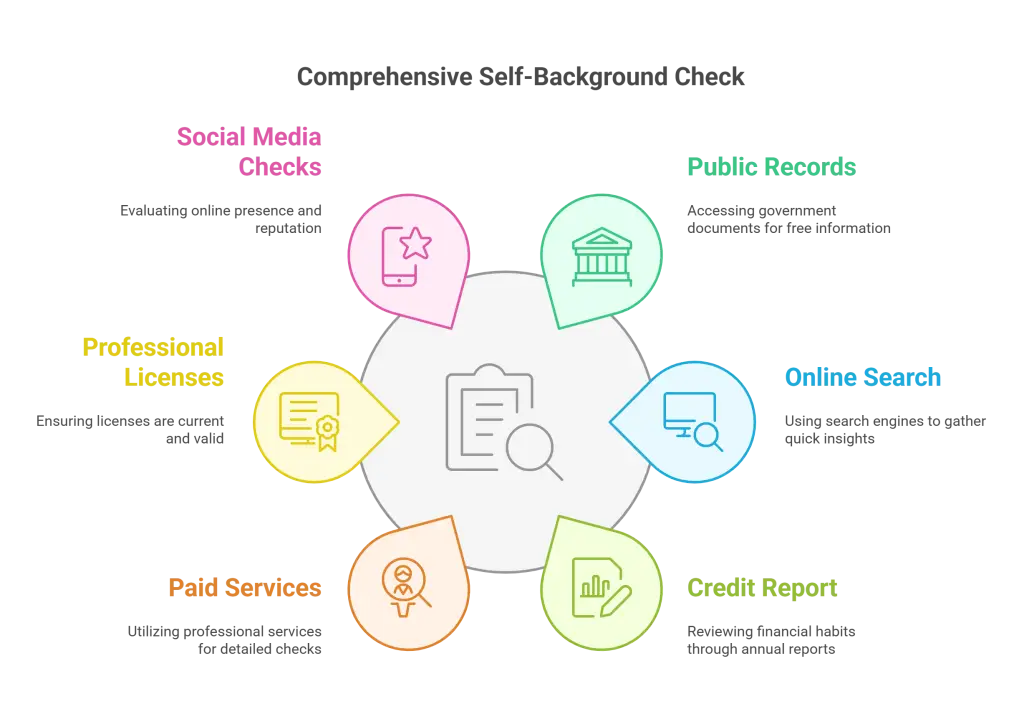Ever wonder what others might find out about you? You're not alone. Many people are curious about their online presence and what information is out there. The good news is, you can run a background check on yourself. It's like looking in a mirror, but instead of seeing your face, you see your life on paper.
Key Takeaways
- Self-background checks are crucial for job hunting, renting, and personal security.
- Both free and paid options exist for running background checks on yourself.
- Background checks can reveal criminal records, civil judgments, driving history, and financial information.
- The "7-year rule" is a myth; some records can remain visible for much longer.
- Regular self-checks are important to catch and correct potential errors in your background report.
Why Run a Background Check on Yourself?
Getting Ready for a Job Hunt
Imagine you're about to play a big game. You'd want to know the field, right? That's what running a background check before job hunting is like. It helps you know what employers might see. If there are any problems, you can fix them or be ready to explain. This way, you're not caught off guard during an interview.
Renting a New Place
Landlords often check backgrounds before renting out apartments. By checking your own background first, you're like a scout checking out the trail ahead. You'll know what to expect and can address any issues before they become problems. This can make finding a new home much easier.
Keeping Your Information Safe
In today's world, our personal information is like gold. Running a background check is like checking your treasure chest to make sure everything's safe. It can help you spot if someone's trying to steal your identity or if there are mistakes in your records.
Peace of Mind
Knowing what's out there about you can help you relax. It's like cleaning out your closet – once it's done, you feel much better. You won't have to worry about surprises popping up when you least expect them.
EXPERT INSIGHT: As HR professionals, we urge candidates to become proactive when it comes to understanding their background by conducting checks periodically. Understanding oneself is more important than ever. Being able to see what employers, landlords, and business partners see is empowering as it allows you to correct and comprehend any possible discrepancies that might arise. Exploring your records beforehand doesn't only safeguards your perspectives but also opens up a world of opportunities. Similarly, failing to understand what exists around you poses a threat to your own identity. Thus, we have to be prepared at all times. workplace where employees can succeed and make meaningful contributions to the organization. - Charm Paz, CHRP
How to Run a Background Check on Yourself
Free Options
There are ways to check your background without spending money. It's like being your own detective:
- Public Records: Many courthouses and government websites let you search records for free. It might take some time, but it's a good start.
- Online Search: Use search engines like Google. It's quick but might not show everything. Think of it as looking through the window of a house – you see some things, but not everything inside.
- Credit Report: You can get a free credit report once a year. It's like a report card for your financial life. It shows your money habits but doesn't include criminal records.
Paid Background Check Services
These are like hiring a professional detective. They're more thorough but cost money.
Pros:
- They're comprehensive and easy to use.
- They often include extra features like social media checks.
- They save you time and effort.
Cons:
- They cost money, and prices can vary.
- Some might try to sell you extra services you don't need.
Tip: Look for services with trial periods or one-time reports. It's like trying on clothes before you buy them.
Digging Deeper
Professional License Checks
If you have professional licenses, make sure they're up to date. It's like making sure your driver's license hasn't expired.
Social Media Checks
Some tools can scan your online presence. It's like looking at yourself through someone else's eyes on social media.
Education History
Confirm your degrees and certifications are correctly listed. It's like double-checking your resume to make sure everything's right.

What Might Show Up?
Criminal Records
This includes any arrests or convictions. Knowing this helps you prepare for questions about your past.
Civil Judgments
These are records of lawsuits or bankruptcies. It's like knowing your financial report card.
Driving Records
This shows accidents and traffic tickets. It's important, especially if you're applying for jobs that involve driving.
Financial History
This includes your credit score and debts. It's like a snapshot of your money habits.
Property Ownership
Records of houses or cars you own. It's a list of your big possessions.
Things to Remember
The "7-Year Rule" Isn't Always True
Some people think records disappear after seven years. That's not always true. Some things can stay on your record much longer.
Background Checks Aren't Perfect
Mistakes can happen. It's like spell-check – sometimes it misses things. Always review your background check for errors.
What to Do If You Find a Mistake
If you spot an error, you can dispute it. It's like raising your hand in class to correct a mistake on the board.
How Often Should You Check?
Once a year is a good start. If you're job hunting, you might want to check more often. It's like regular check-ups at the doctor.
Can You Erase Your Record?
Sometimes, you can expunge (erase) things from your record. It depends on where you live and what's on your record. It's like erasing a blackboard, but with legal rules.
Wrap-Up
Staying ahead by taking the initiative to conduct a background check on yourself is a wise decision. It's important to accept that background check discrepancies can happen to anyone. While this is a fact we can't deny, we can mitigate the negative effects by staying proactive and doing our own checks. When you are aware of what's happening around you and within you, there’s no greater peace of mind because you are prepared — whether you're job hunting or engaging in personal transactions. It's like being the author of your own story — you want to ensure it’s accurate and up-to-date, because no one else can rewrite it for you.
Ready to take a look at your own background? Start with a simple online search and see what you find. You might be surprised at what's out there about you. Remember, knowledge is power. The more you know about your background, the better prepared you'll be for whatever life throws your way.

GCheck Editorial Team
Meet the GCheck Editorial Team, your trusted source for insightful and up-to-date information in the world of employment background checks. Committed to delivering the latest trends, best practices, and industry insights, our team is dedicated to keeping you informed.
With a passion for ensuring accuracy, compliance, and efficiency in background screening, we are your go-to experts in the field. Stay tuned for our comprehensive articles, guides, and analysis, designed to empower businesses and individuals with the knowledge they need to make informed decisions.
At GCheck, we're here to guide you through the complexities of background checks, every step of the way.






